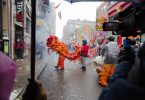Xin Fang
BU News Service
Chung-Chi Che doesn’t like to miss a single night patrolling in Chinatown.
Che, 67, is a Macanese veteran and former chief inspector for the MBTA Green Line. He started patrolling Chinatown as a volunteer in 2014, but has been the executive trustee for the Chinese Consolidated Benevolent Association of New England (CCBA) for over 10 years. Che is known for his dedication to maintaining Chinatown’s safety.
“It’s actually getting safer out there, compared with the old time,” Che said.
A Haven for Drug Trade
The stretch of Boylston Street in downtown Boston is infamous for drug users and dealers.
Until twenty years ago, Chinatown used to be known as “the Combat Zone” because of the gangs, prostitutes or porn shops that lined the streets. The situation improved under a rezoning project designed by Boston Redevelopment Authority (BRA), but Chinatown now faces other challenges; an enduring drug issue is one of the main concerns to many Chinatown residents.
On a recent night patrol, Che walked through narrow streets, peeking into alleys he said were havens for drug users and dealers.
“They used to like hanging out here because it’s dark and no one can, or dare to, peek inside the alley,” Che said while using a small torch to find used needles. “[Drug users] are getting more alerted,” Che said as he continued patrolling on the next alley. “We used to find a lot of needles here but not as many now, because the addicts are getting smarter.”
The block between Washington and Tremont streets is an urban mix of buildings. Luxury high-rise apartments are located side by side with St. Francis House, the largest day shelter for the homeless in New England.
“St. Francis House has been one of the main spots for drug dealing in the neighborhood,” Che said. “Drug dealers sell drugs to many of the homeless people in the shelter. Thursdays are relatively quiet; it’s actually Friday and Saturday nights that get out of control.”
Ten years ago in Chinatown, public drinking and smoking were rampant. It still happens today, but not as frequently as in the past.
“Drug users used to be found outside the CVS and the backyard of the parking lot,” Che said.
Last year, Che and Simon Chan, 60, a delivery worker for a wholesale market, found several used needles in the Quincy School’s, an elementary school in Chinatown, in the gardening area where children play.
“All we can do is to tell these drunk homeless people not to block the street or occupy public areas,” Chan said.
“At the height of drug issue, we can find more than ten needles per day at the Quincy School,” Che continued. “What if primary school kids pick them up and play with them?”
“It’s Not a Systematic Problem Now”
Boston Chinatown Crime Watch was established in 2005 to respond to the urgent need for rebuilding the reputation of Chinatown. Paul Chan, one of the founders of BCCW, also works as the Director of Development in Massachusetts Housing Investment Corporation. Back then, the crime in Chinatown was rampant and residents felt unsafe walking the streets especially at night.
“We used to hire detailed police, and crime rate of Chinatown dropped significantly during 2005 and 2006, but the cost was too high and we had to discontinue the initiative,” Paul Chan said. “Thanks to the donations we have received from various associations, BCCW is able to continue to nowadays.”
Members of the Crime Watch are only armed with a blue vest bearing the group’s name and walkie-talkies.
Neighborhood Has Always Been Vulnerable
Long time residents say Boston Chinatown has been continually exploited over the years. During Urban Renewal in the 1960s, Boston claimed a large residential area in the name of eminent domain and proceeded to build a highway, I-93. In the 1970s, the Chinatown Master Plan and zoning of “the Combat Zone” led to continual problems of violence and crime in the community; and during 1980s, institutional expansion of Tufts medical facilities took another large part of the remaining Chinatown area.
Luckily, issues like drug dealing and alcoholism have been greatly improved, thanks to the dedication of Crime Watch and other nonprofit associations in Chinatown. Truong Thanh Market, a liquor store located at the Beach Street next to Chinatown Gate and Mary Soo Hoo Park, used to sell bottle liquors that only cost one or two dollars.
“[Public drinking] is getting better as well since [Truong Thanh Market] stops selling bottle liquors in recent years,” Paul Chan said.
Striving for a Drug-Free Neighborhood
Residents say they have noticed the contribution of Crime Watch to local safety.
“[The Crime Watch] really helps saving the reputation of Chinatown,” Larry Young, a retired journalist of Sing Dao Daily News who also patrols as a volunteer for the Crime Watch, said. “More street lights are helpful to the situation as well.”
The relationship between the community and police in A-1 district is cooperative.
“We think the government can do something more to our community, because it’s not enough for associations to work on improving the community solely,” Young said.
Simon, as well as many other Chinatown residents, think Chinatown needs more police patrol. The Boston Police have not responded to repeated requests for comment.








[…] Crime Watchers Help Combat Drug Issues in Chinatown […]